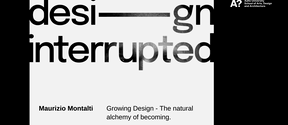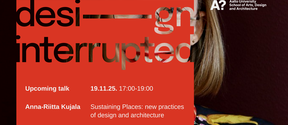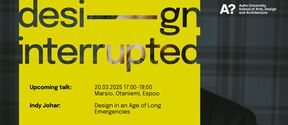Growing Design - The natural alchemy of becoming.
Maurizio explores partnering with Funga to deliver a re-generative material culture.
Today, the study and practice of design are in great flux. We are amidst the biggest socio-economic transformation since the 1750s, experiencing the fifth Industrial Revolution. There is a growing pressure to transition economies driven by extractive, wasteful and polluting logics towards systems designed to fit the planetary limits. Such transformation requires the design of new types of products and services, as well as new systems and approaches to large-scale changes.
At the same time, design as a practice area is also changing. It is shifting away from a more rigidly defined practice of professionally trained designers creating graphics, objects and spaces towards a practice that is loosely defined, fuzzy and seemingly omnipresent. Many have been calling for democratizing design and recognizing the efforts of non-professional designers. Design thinking, methods and practices have entered many contexts, including governance, jurisprudence, sciences and activism. The design community has been grappling with the ever-expanding definitions of what design is and who a designer is.
This talk series invites design professionals, students, academics and anyone interested in these challenges to a series of conversations. Each event features a scene-setting lecture by a leading practitioner and thinker followed by open discussion. Three themes give focus to the series: digital, societal and material transformations. What is design’s role in these transformations? How do we generate new know-how to support the needed transitions, and what examples already exist that we can learn from? What stands in the way of progress towards equitable, diverse, and sustainable lives, and what is the role of design in removing such blockages? What are design and designers in this new context?
Department of Design at Aalto University invites you to join our conversations to explore what design is, can and should be in the 21st Century.
The talk series is funded by the Kone Foundation.





Maurizio explores partnering with Funga to deliver a re-generative material culture.

In this Design Interrupted talk, Anna-Riitta Kujala shares what it means to be responsible for urban vitality.
The event is free, but requires registration.

Elise By Olsen will present her projects starting with youth culture magazine Recens Paper via fashion commentary journal Wallet to the specialized library International Library of Fashion Research. Her talk will be followed by a panel discussion on the drifting - both intentional and unintentional - that often happens during design professionals' careers

Silvio Lorusso delves into the disillusionment in contemporary design culture and challenges designers rethink their role within the chaos.

Talk by Mathilda Tham (PhD) on enabling new though and action in design through Earth logic to address pressing sustainability challenges.

Kieran Long explores how design exhibitions and events can go far beyond celebrating the work of designers to engage citizens’ imagination.

A panel discussion by professors of the Department of Design, Aalto University, about the past, present and future of design.

This talk by Indy Johar is part of the Design Interrupted talk series organized by the Department of Design, Aalto University.

In his talk, Olavi Lindén will reflect on how, in a world with limited resources, it becomes more and more irresponsible to develop and produce products for profit only.

Anab Jain's talk will explore our shared responsibility as designers to instill hope and agency amidst entangled humanitarian, ecological and technological crises.

In her talk, Vera Liao will reflect on the roles design can and should play in Responsible AI.